3. Citizen Observation

The press briefing zone and call center of the Monitoring Center of the Civic Chamber of Russia for voting observation. Press Service of the Civic Chamber of the Russian Federation
Citizen observation of voting today is a comprehensive legal mechanism and a large-scale ecosystem that includes a system of norms and institutions, organizations, and values, as well as established practices aimed at ensuring the integrity, transparency, and legitimacy of electoral processes in the Russian Federation.
Development of the citizen observation institution in Russia
The Civic Chamber of the Russian Federation and the civic chambers of the regions of the Russian Federation have been performing public monitoring of citizens’ electoral compliance since 2012.
Thanks to the efforts of the Civic Chamber of Russia, supported by the civic chambers of the regions of the Russian Federation, legislative formalization of the institution of citizen observation has been occurring since 2018, and the Civic Chamber of Russia and the civic chambers of the regions of the Russian Federation have been granted the right to appoint nonpartisan observers to elections at all levels throughout the country.
The institution of civic chambers has been granted the right to appoint observers to election commissions during the elections of the President of the Russian Federation, deputies of the State Duma of the Federal Assembly of the Russian Federation, as well as elections for the state authorities of the subjects of the Federation and local governance bodies. From that moment, with the direct participation of the Civic Chamber, the system of citizen observation in the country has consistently expanded and improved, and innovations aimed at enhancing the role of civil society institutions in ensuring voting oversight have been reflected in legislative acts.
A comprehensive methodology for citizen observation, developed by experts from the Civic Chamber, includes provisions for the appointment of observers to elections, the so-called “Gold Standard” of citizen observation, which allowed for the evaluation of the voting process at all its stages, from the opening to the closing of polling stations, as well as a code of ethics for citizen observers, reflecting the main principles of public oversight. This methodology systematized and standardized the citizen observation process, laying the foundations for one of the most successful practices of public oversight in the Russian Federation.
The Institution of citizen election observation in the Russian Federation
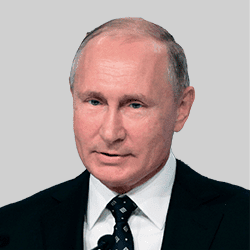
“Public oversight at all stages of the electoral process is in demand—this will make the election process more transparent, and, therefore, the results will be more trusted by our citizens.”96
— V.V. Putin
President of the Russian Federation
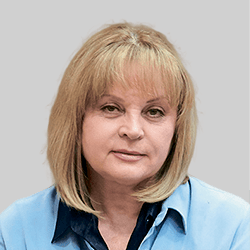
“Citizen observers at polling stations have significantly strengthened independent oversight in recent elections. They operate in conditions of absolute transparency and support the proper functioning of electoral commissions.”
— E.A. Pamfilova
Chairperson of the Central Election Commission of Russia
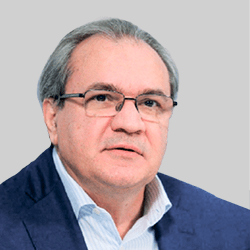
“Citizen observation has become the norm; no other country has such a system. I believe that this institution is well- established and effective.”
— V.A. Fadeev
Chairperson of the Presidential Council for the Development of Civil Society and Human Rights of the Russian Federation
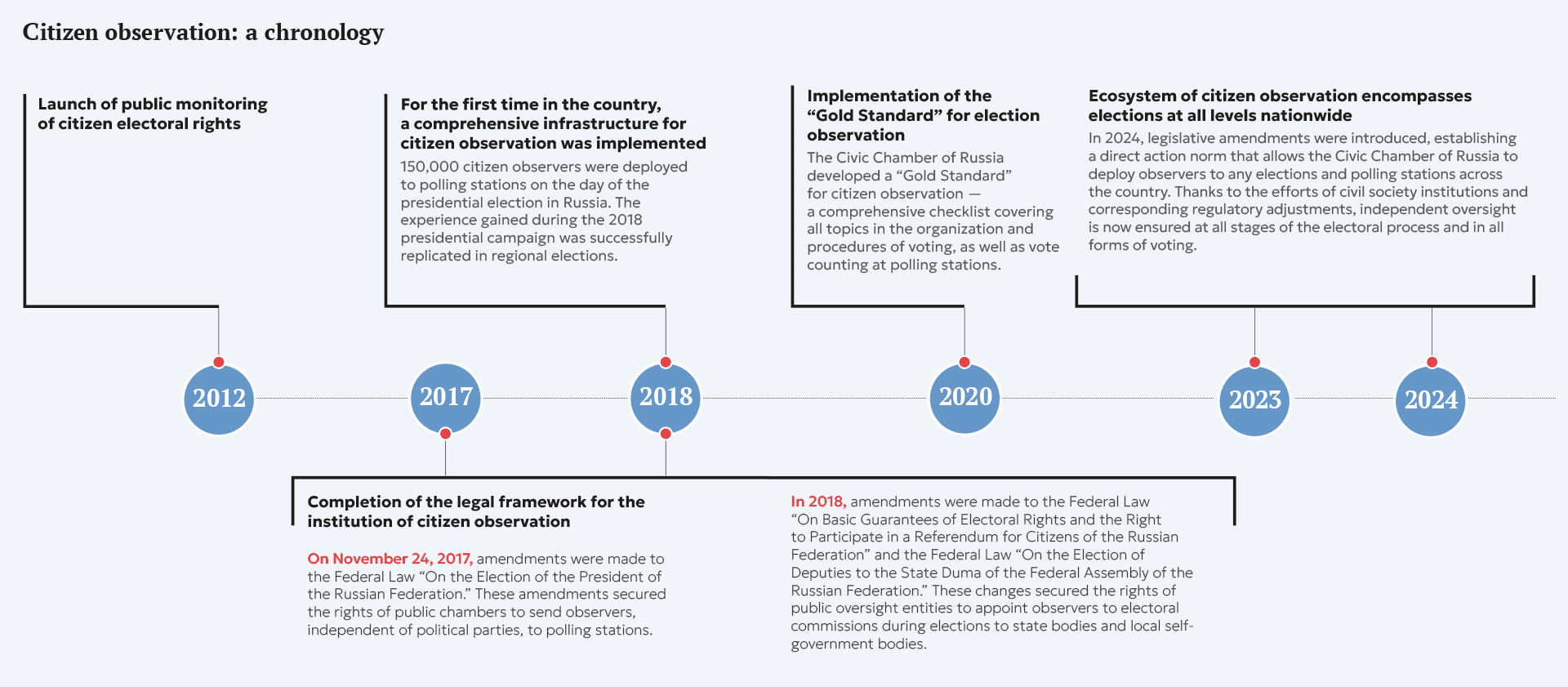
The Monitoring Center of the Civic Chamber of Russia for election observation
Since its establishment in 2012, the Monitoring Center of the Civic Chamber of Russia for election observation has played an essential role in the rapid deployment of the citizen observation system, maintaining communication with observers, and coordinating continuous monitoring and analysis of voting progress across the regions of Russia.
The Monitoring Center for election observation usually begins its work the day before elections start, ensuring round-the-clock monitoring of the voting process and concludes its activities by summarizing the observations made the day after the elections end.
By 2024, the Monitoring Center of the Civic Chamber had become not only a powerful information and analytical hub that collects and provides expert evaluations of potential issues and violations reported by observers and voters across all regions of the Russian Federation in real-time, but also an open platform demonstrating the capabilities of the institution of citizen observation to all interested parties.
Thanks to years of effective operation, the Monitoring Center has turned citizen observation into an independent and recognizable brand trusted by voters and election commissions alike.
Today, the basic structure of the Monitoring Center of the Civic Chamber for election observation consists of:
-
Call Center: Staffed by volunteers from the Civic Chamber’s volunteer corps, it facilitates communication with observers and conducts initial verification of reports concerning possible issues during the voting process.
-
Hotline of the Civic Chamber of Russia: This service receives calls from observers and citizens, processes messages received through the Civic Chamber’s digital feedback channels.
-
Analytical Center: Conducts monitoring of open sources on the internet, social media channels, and messengers for messages about possible violations in the organization and conduct of voting.
-
Response Group: Transfers received problem reports to regional citizen election observation headquarters for further verification and processing, and records information on the outcomes of these processes.
-
Press Center: Organizes press briefings and liaises with speakers and media representatives.
-
Media Support Group: Covers the activities of the Monitoring Center on the Civic Chamber of Russia’s information resources.
-
Expert Group for Technical Monitoring of Remote Electronic Voting: Composed of IT specialists, this group oversees the technical aspects of remote voting.
-
International Group: Works with international observers and experts arriving in Russia and with citizen observers at polling stations outside the Russian Federation.
The Monitoring Center for the Russian Presidential elections, March 15–17, 2024
The pivotal event in the sociopolitical life of Russia in 2024, which effectively determines the country’s development path for the next six years, was the election of the President of the Russian Federation.
By the presidential elections, the Civic Chamber of Russia had amassed a wealth of experience in public monitoring and carried out extensive preparatory work, a crucial part of which involved training citizen observers. With the support of regional civic chambers, specialized public organizations, and political parties that joined the cooperation agreement for election monitoring, a corps of citizen observers was formed and trained. Methodological materials were significantly updated, with the Civic Chamber’s continually advancing “Gold Standard” of public monitoring serving as the foundation for observer preparation. Seventeen political parties and 64 nonprofit organizations signed an agreement with the Civic Chamber of Russia to participate in monitoring the presidential election voting process.
71 delegations, representatives of seven political parties, and over 1,500 citizens visited the Civic Chamber’s Monitoring Center during the election days.
From March 14 to 18, the Monitoring Center for public monitoring of the Russian presidential elections was deployed within the Civic Chamber. For the first time in the history of citizen observation, the center operated in a new format: round-the-clock broadcasting took place in the Monitoring Center’s studio, where public figures, experts, opinion leaders, and on-ground observers provided objective assessments and reliable information about the voting process.
In response to attempts to discredit the elections, speakers from the Monitoring Center regularly shared key data on the election monitoring process with representatives of Russian and international media, addressed pressing questions, and presented vivid case studies, clearly illustrating the voting process at polling stations across Russia’s regions.
During the election period, the Monitoring Center opened its doors not only to experts and media representatives but also to anyone interested in learning about the public monitoring system’s operations, garnering considerable interest within Russian society.
17 political parties and 64 nonprofit organizations signed an agreement with the Civic Chamber of Russia to participate in monitoring the voting process during the presidential elections of the Russian Federation.
In 2024, the work of the Monitoring Center’s group responsible for overseeing remote electronic voting was reformatted. For the first time, students from Russian technical universities were appointed as observers of the remote electronic voting from the Civic Chamber of Russia, which, on one hand, significantly expanded the monitoring coverage and, on the other, increased the number of remote electronic voting experts. This initiative provided students the opportunity to enhance their knowledge of electronic voting infrastructure.
On March 18, the final press briefing of the Civic Chamber of Russia’s Monitoring Center on public oversight of the presidential election voting concluded the three-day observation.
Experts noted the unprecedented historic voter turnout, reflecting a high level of consolidation in Russian society, and the minimal number of deviations from the “Gold Standard” of public monitoring, which covered all stages of the electoral process during the presidential election.
Experts highlighted the crucial role of citizen observers in ensuring the transparency and openness of the electoral process.
Based on the compilation of all information received by the Monitoring Center during public monitoring of the presidential campaign, the Coordinating Council under the Civic Chamber of the Russian Federation for public oversight of voting presented a draft of recommendations for the upcoming elections.
Monitoring Center of the Civic Chamber for the Russian Presidential elections, March 15–17, 2024
From March 14 to 17, a Monitoring Center for citizen observation of the Russian Presidential elections operated around the clock at the Civic Chamber of the Russian Federation venue. The Monitoring Center of the Civic Chamber served not only as an information-analytical hub that collected and assessed all reports from observers and voters, but it also functioned in a renewed format — an open platform that promoted transparency in the voting process.
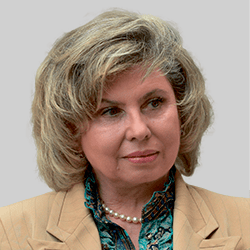
“Each year, the Monitoring Center of the Civic Chamber of the Russian Federation is equipped with new tools and, of course, is quite impressive. It’s crucial that there is a well-established connection between public demand and government agencies. We can immediately, firsthand, gather insights into the regional situation and receive information about potential violations right here.”
— Tatiana Moskalkova
Commissioner for Human Rights in the Russian Federation
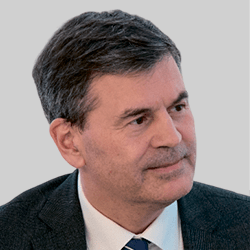
“One of the strongest impressions from the work of the Monitoring Center of the Civic Chamber of Russia is the clarity and coordination of the entire team’s actions. Here, everyone is in their place, with a well-established system of interchangeability, and yet a very productive and comfortable atmosphere. With such a center, there can be no doubt about the level of public oversight of the elections.”
— Alexey Komissarov
Rector of RANEPA, General Director of Autonomous Nonprofit Organization “Russia — Land of Opportunity”
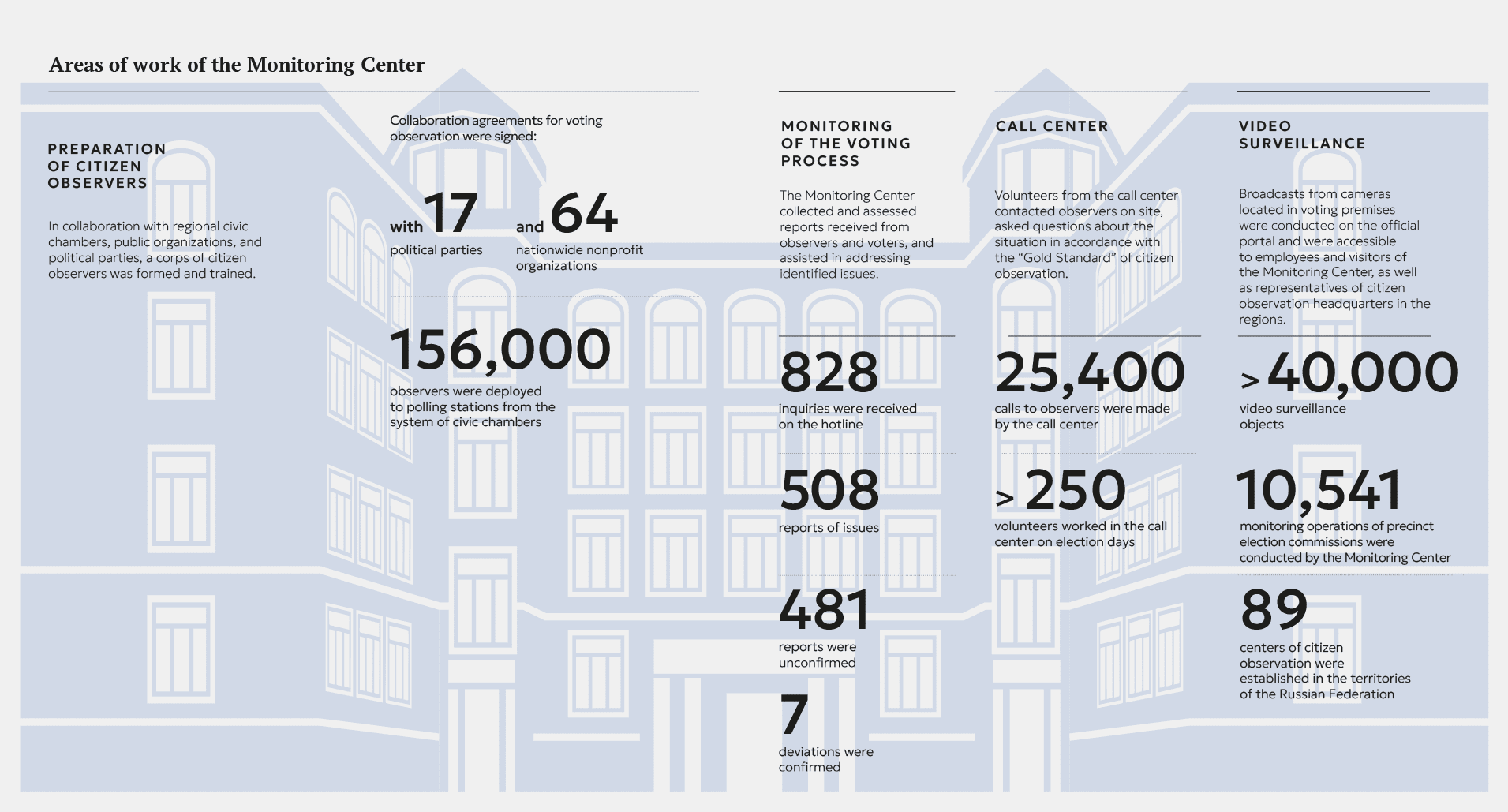
Operation of the Monitoring Center on the Unified Voting Day — 2024
On the Unified Voting Day, September 8, 2024, in the Russian Federation, four thousand electoral campaigns of various levels took place, including by-elections to the State Duma, regional heads’ elections, elections of deputies to legislative bodies of state power, and numerous elections at the municipal level.
As part of the preparation for a massive citizen observation procedure on the Unified Voting Day -2024, the Civic Chamber, in collaboration with specialized organizations, launched a wide educational campaign. Observer training was conducted using updated methodologies, taking into account the experience from the presidential election campaign in Russia in March 2024 and legislative innovations. The Civic Chamber, together with specialized organizations, continued the successful practice of joint training for observers from the institute of civic chambers, political parties, and candidates. According to experts, this practice contributes to the formation of stable horizontal ties among observers.
Over 65,000 observers had undergone training for the Unified Voting Day — 2024 across 893 seminars.
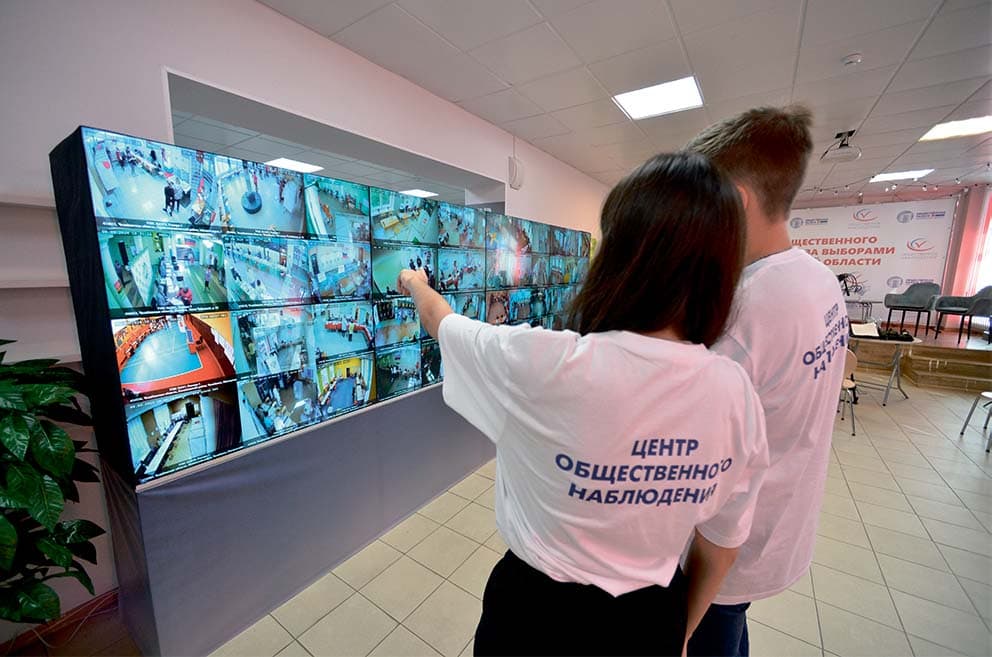
Citizen Observation Center for Elections in Chelyabinsk, September 8, 2024. Alexander Kondratyuk / RIA Novosti
A fundamentally new tool for observers was specially developed checklists, helping to monitor key electoral procedures and containing concentrated information on the most important procedural topics in voting.
In all 83 regions where elections were held, independent platforms for interaction between candidates and parties, exchange of opinions, and discussions on the electoral campaign’s progress were opened based on the civic chambers of the regions of the Russian Federation —citizen election observation headquarters. These platforms were also venues for sociologists, political scientists, and other experts.
The Monitoring Center was opened in the Civic Chamber of the Russian Federation on September 5 and traditionally operated around the clock until September 9, 2024. The Monitoring Center became a platform that accumulated the most current information on the three-day voting process in the regions of Russia.
During a series of press briefings, observers, representatives of regional citizen election observation headquarters, experts, and public opinion leaders reported on the voting process, sharing reliable information, photos, and video materials.
On September 9, at the final press conference held at the Monitoring Center of the Civic Chamber for public voting control, experts and public representatives summed up the citizen observation of the Unified Voting Day elections — 2024.
Social activists noted that the results of the Monitoring Center’s operations during the presidential elections and the Unified Voting Day in 2024 once again demonstrated that the presence of independent citizen observers at polling stations, who have direct and consolidated support from civil society institutions, has become a powerful factor in preventing most potential violations.
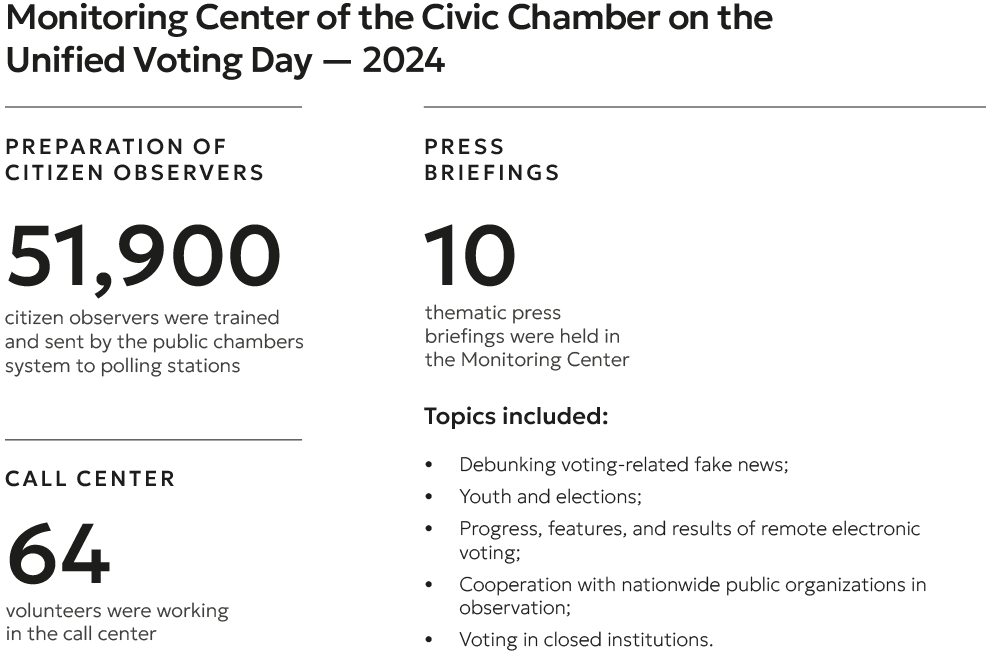

- 2024: The Main Topics in Russian Civil Society
- Civil Society and the State
- Institutions of civil society as catalysts for social change
- Collaboration and cooperation between society and the state
- Consolidated efforts of public institutions to support Special Military Operation veterans
- Public participation in achieving national development goals
- 2024 — the Year of the Family
- Nonprofit organizations: a means for partnership between the state and society
- Interaction of the institution of commissioners in the Russian Federation with civil society
- Social investments as a state contribution to developing the civic potential of the nation
- Institutions of civil society as catalysts for social change
- Citizen Observation
- Public Oversight
- Citizen Appeals
- Public Diplomacy
- Conclusion. Public Initiatives for a New Era